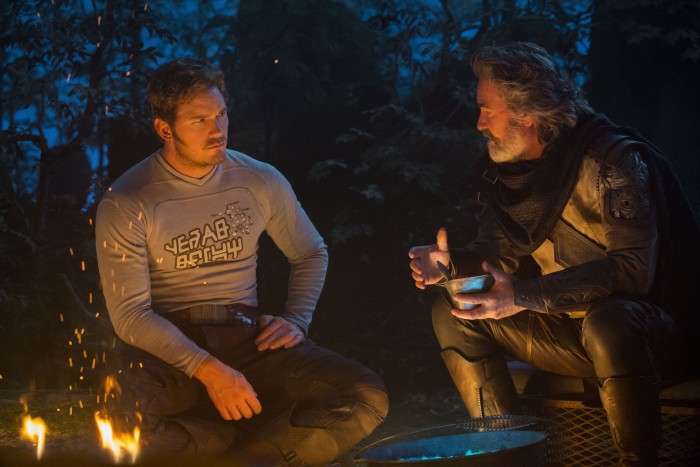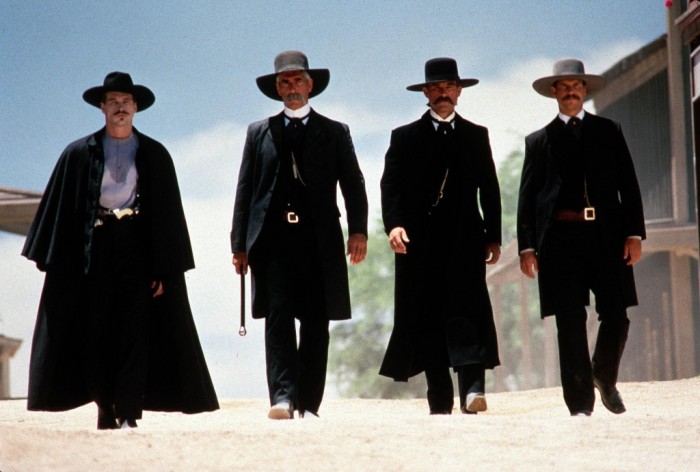Kurt Russell On His Approach To Ego In 'Guardians Vol. 2' And The Most Surprising Thing About 'Tombstone' [Interview]
Marvel Studios has gone on a near-miraculous run of making perfect choices when it comes to casting their leading roles. Robert Downey Jr., Chris Evans, Scarlett Johansson, Benedict Cumberbatch...the list goes on. But from the very beginning, when they cast Jeff Bridges in the first Iron Man, they've also been terrific at luring A-list talent to fill out the supporting roles in their movies. I consider that to be a critical component of their overall success.
The latest example of spot-on casting? Securing Kurt Russell as Ego, the long-lost father of Chris Pratt's Peter Quill in Guardians of the Galaxy Vol. 2.
I had the opportunity to sit down with Russell – whose body of work makes him a pitch perfect fit for this character – at the film's press junket in West Hollywood. We spoke about his approach to playing such a strange being (Ego is a living planet, for those who don't know), the concept of digital de-aging, the most surprising aspect of making the 1993 western classic Tombstone, and more. Read on for our Kurt Russell interview.
Before we go any further, I should mention that this interview contains some pretty major spoilers right from the start. Guardians Vol. 2 is in theaters now, so make sure you go see it before you read this. Proceed with extreme caution.
***
How did you react when you first learned about the true nature of Ego?
I thought it was cool. The first movie was so beloved that I said, 'OK, I want to do the right things, not the wrong things here.' As I began to learn about Ego – not from the screenplay, but from talking to James about it – I realized he was going to run the gamut here. And he's going to do things and say things and we're going to do things with him that you're going to not know whether he's...is he honestly feeling that emotional, or where did that come from?
And then you realize the power he has. There's nothing he can't do. That's a lot of space to play in, but you really need to keep hooking into the fact that this is about a son that didn't know who his father was, created an image of a man, and this guy was falling short but vastly exceeding his expectations. He's dealing with that reality, and the father is experiencing it as well as manipulating it, as a father might do who's in that situation.
So it was always going back and forth between reality and fantasy, but it's that edgy thing that James likes that is my sense of humor, which culminates in "Brandy." [Laughs] Seriously talking to your son about, 'We're the guys in that song. It's the greatest song ever written.'
A lot of actors who play bad guys say they can't consider their characters to be villains because they have to be able to see things from the character's point of view, and most villains don't think of themselves as villains. Do you consider Ego a villain?
I don't think it's as important to find him a villain or not a villain. I think what's important about Ego is his name. It's that simple.
Yeah, it kind of is.
There it is. First thing out of his mouth is, 'My name is Ego.' That's going to say it all.
What was your approach to playing him? Did you have to find a way to relate to him in order to do him justice?
It's kind of a wide palette that you can choose from, so you better hone in one what's relatable. We're going to see things that aren't. But if you hone in on what's relatable, then there's an emotional center to it. That was really all I was focusing on. Look, it's interesting – families do what they do, and relationships within those families can run the gamut. I mean, run the gamut, right? So not really, I didn't worry about it. It's a Marvel movie. You're going to cheer for somebody at some point. So you know that. The characters are going to do what they do.
You mentioned at the press conference that you played the younger version of yourself [that appears in the opening scene]. So that was all you? There were no body doubles or anything there?
We assumed we were going to do it the way it's been done lately, which is completely with CGI and special effects. Dennis Liddiard's my makeup man. We've done 28 movies together. He told them before we got going, before they put dots on your face and all that, he said, 'You know guys, I really know his face and there are a lot of tricks I can pull myself to bring his age down. Would that be helpful to you?' And they said, 'Yeah, anything you can do would be helpful.' And when he was finished and I got the wardrobe on and we got the hair right, and the actor – me – had the opportunity to look at that and say, 'OK, I've just gotta feel younger myself,' it made sense. The combination of those things let us do what I wanted to do, which was create an impression, not an image. There's going to be some misdirect involved with that. I'm going to do things to make you not look at something, but you're just going to accept it and feel it and hopefully it'll be more natural.
I ran into the woman last night who's the head of the CGI aspect, and she said, 'What do you think about what we did?' And I said, 'I thought it was great, but it's my understanding you didn't have to do a whole lot.' And she said, 'We didn't. He really pulled some shit there. There's a lot going on there.' And I said, 'Yeah, we wanted to do it old school.' I think it provides a more natural look.
What do you think about the concept of digital de-aging? Would you consider doing an entire movie that way?
Oh, sure. Bob Zemeckis and I, when we did Used Cars back in 1822 [Laughs], we talked about it. I said, 'You know, the day is going to come – and I think it'll be kind of interesting and fun – where you hire the actor, but...' Let's take this as an example. Let's say this is done 40 years from now and they've perfected it. For some reason – I'll do my dream fun thing – they say, 'We're going to have Marilyn Monroe and Kurt Russell. We want Kurt Russell when he was 32.' And you make the deal because you hire the actor, but the actor's just going to sit there with the director. I think you have to have that and say, 'I'm not just giving you my image, but I'm going to work with you as I would work with you on the set. And we have to come to some sort of agreement that I have input here. You can't just turn this completely over because I don't think that's fair.'
And he and I would go back and forth. We had great conversations because, from the director's point of view, he'd go, 'No, I want to Roger Rabbit this. I want to be able to control everything everybody does.' And the actor's saying, 'Wait a minute.' And, by the way, [that collaboration could result in] some better ideas, too, and work together. Do I think that would be fun? Absolutely, I think that would be fun.
I have one more question for you. Tombstone is one of my favorite movies of all time. What was the biggest thing that surprised you about that film?
[Long pause] The honest answer is, I had gone out and got the money for the movie. I was responsible for that. I had backed the writer as the director. The biggest surprise was, he was as lost as a director as he was found as a writer. He was a brilliant writer, but it's a different job. Bringing it to life is a different job. He was really in trouble there. They let him go. So the biggest surprise was that he was unable to do that.
Thanks very much for your time. It was great to meet you.
You, too. I'm glad you like Tombstone.


